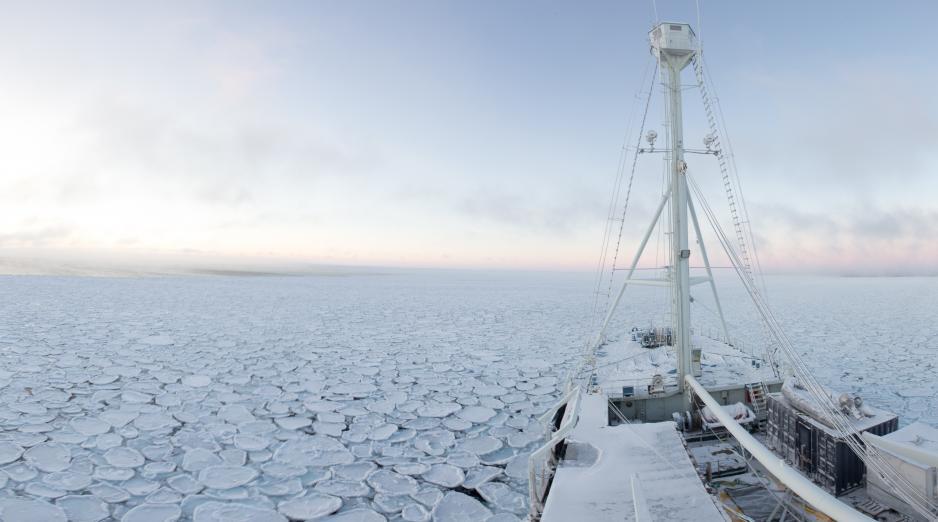(Photo: Paul Dodd, the Norwegian Polar Institute)
The last two months have brought about the deepest rift in international relations and circumpolar and northern regional collaboration since the end of the Cold War. The international Arctic scientific cooperation has been similarly affected.
On March 3, seven Arctic nations - Canada, Kingdom of Denmark, Finland, Iceland, Norway, Sweden, and the United States - announced a temporary pause in participation in all meetings of the Arctic Council (AC), including of its Working Groups which are primarily vehicles for scientific work and circumpolar assessments produced by the AC. In a similar manner, on March 9, 2022, the activities of the Barents Euro-Arctic Council (BEAC) and cooperation involving eight Arctic nations were suspended and the meetings of the International Council for the Exploration of the Seas (ICES) take place at this point without all Arctic Ocean rim nations on board. Finally, bilateral collaboration in science, research, education, and innovation between Russia and many European countries and the European Commission has been put on hold as well – for the time being closing the doors to science diplomacy and joint scientific work that characterized Arctic relations for the last 30 years or more.
Among the affected venues for international Arctic scientific cooperation appears to be the Arctic Science Ministerial (ASM) – the largest biennial gathering of science ministers from more than 20 countries active in Arctic research, representatives of Arctic Indigenous Peoples, and the European Union (EU). The next ASM was scheduled to take place in spring 2023, two years after the previous meeting (ASM III) was co-organized by Iceland and Japan virtually and in Tokyo in May 2021. The ASM III had been originally planned to take place in autumn 2020 but was rescheduled due to the COVID-19 pandemic.
Now, it is once again unclear whether the next ASM will take place as initially envisioned. While the long-term outcomes of the present international crisis are yet to be seen, the ASM is an important high-level forum and – given that until now it was organized only 3 times – the one that might be still too vulnerable to be postponed indefinitely.
Therefore, we propose that Norway steps in to co-host the next ASM in 2023 or 2024. Such a move would stay largely in line with the practice until now when the ASM meetings, except for the first one, were co-organized by a non-Arctic state/actor and the Arctic country holding the AC Chairmanship. As the next Chair of the Arctic Council (2023-2025), Norway is well positioned to take that responsibility and initiative. It would also allow the ASM to continue as a platform for facilitating and advancing international Arctic science right at the time when it is most needed.
Irrespective of the current pause in circumpolar collaboration, the long-term drivers of change in the Arctic are not fading away. Instead, they are expected to intensify in the coming years and decades. As confirmed by the recent IPCC sixth assessment report on impacts, adaptation, and vulnerability to climate change, the impacts of climate change will become increasingly felt and further exacerbate already high risks to Arctic biodiversity, permafrost, and communities relying on Arctic ecosystems.
The current state, the unprecedented pace of change, and various socio-ecological challenges of Arctic transformation require enhanced international Arctic scientific cooperation and capacities to observe, understand, and inform addressing the impacts of the ongoing change. Long-term monitoring is key to improving the understanding of the Arctic and global climate system, including the roles of the Arctic Ocean and thawing permafrost. Despite improvements, monitoring initiatives remain sparse in Arctic science and the ASM could further support sustained Arctic observations.
The next ASM could also enable discussions about future large-scale multinational Arctic campaigns. Arguably, it could serve as an important venue to promote and prepare the ground for the next International Polar Year (IPY) that could take place in 2032/2033. The preparations and organization of the effort as massive as the IPY require years of work and planning – and the next ASM could be a significant stepping stone in that process.
As the scale and complexity of Arctic change exceed the capabilities of any individual country or actor to fully comprehend and prepare for the changes ahead, preserving international Arctic scientific collaboration is critical for the benefit of both Arctic and non-Arctic nations and societies. In times of crisis, it is also more important than ever – and Norway can play an active role in enabling it.

